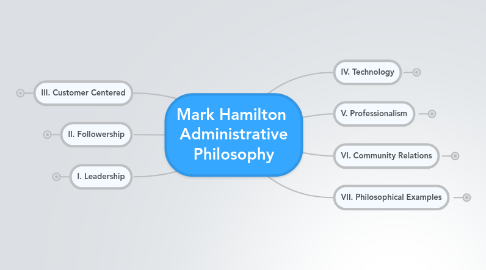
1. III. Customer Centered
1.1. a. Keys to maintain excellence
1.1.1. i. Advocate for the customer
1.1.2. ii. Model positive attitudes at all times
1.1.3. iii. Organization and regular routines
1.1.4. vi. Provide regular feedback
1.2. b. Life Long relationship
1.2.1. Foster relationships that will promote trust
2. II. Followership
2.1. a. People follow ideas, not objectives
2.1.1. They don’t buy what you do -they buy why you do it -Simon Sinek
2.2. b. Inspirational vision
2.2.1. Teach leaders how to build platforms that will inspire others - Simon Sinek
3. I. Leadership
3.1. a. Service
3.1.1. Address the concerns of the individuals / never compromise the mission
3.2. b. Sensitivity
3.2.1. There are many diverse personality types and learning styles / Acknowledge them
3.3. c. Collaboration
3.3.1. i. Gain perspective
3.3.1.1. inclusionary tactics generate successful outcomes
3.3.2. ii. Coaching
3.3.2.1. work together to navigate current changes
3.3.3. iii. Delegation
3.3.3.1. develop a team of staff members to become local experts and train others
3.4. d. Example
3.4.1. i. Be the expert
3.4.1.1. research, study and comply with industry, state and local entities
3.4.2. ii. Model best practices
3.4.2.1. constant regiment of self-assessment / maximize performance
4. IV. Technology
4.1. a. Implementation
4.1.1. i. Can supplement productivity
4.1.2. ii. Will be most effective only when end users are properly trained
5. V. Professionalism
5.1. a. Attitude
5.1.1. Am I not destroying my enemies when I make friends of them? -Abraham Lincoln
5.2. b. Communication / technology based
5.2.1. Return all messages in a timely fashion
5.3. c. Appearance
5.4. d. Continual / relevant training
5.4.1. i. Should be available for all staff members
5.4.2. ii. Constant reflection / self-evaluation
6. VI. Community Relations
6.1. a. Communication / technology based
6.1.1. Proactive and continual / promote solutions
6.2. b. Visible
6.2.1. Attend all industry events
6.3. c. Interactions
6.3.1. Support all customer events
6.4. d. Proactive
6.4.1. i. Meet, engage and understand stakeholders
6.4.2. ii. Provide solutions
7. VII. Philosophical Examples
7.1. b. John Wooden- COACH
7.1.1. “A coach is someone who can give correction without causing resentment”
7.1.1.1. http://www.coachwooden.com/index2.html
7.2. c. Simon Sinek- LEADERSHIP
7.2.1. Author, Motivational speaker, Ethnographer
7.2.2. “Start with Why: How Great Leaders Inspire Everyone to Take Action”
7.2.2.1. http://bit.ly/dcDsbx
7.3. d. Chris Voss - NEGOTIATION
7.3.1. “He who has learned to disagree without being disagreeable has discovered the most valuable secret of negotiation.” - Chris Voss, Never Split the Difference: Negotiating As If Your Life Depended On
7.3.1.1. www.blackswanltd.com
7.4. e. Abraham Lincoln- HONESTY
7.4.1. “No man has a good enough memory to make a successful liar”
7.4.1.1. www.greatamericanhistory.net/honesty.htm
7.5. g. Tom Hopkins - SALES
7.5.1. “How many no’s am I willing to accept on my way to success?” - Tom Hopkins, How to Master the Art of Selling
7.5.1.1. www.tomhopkins.com
